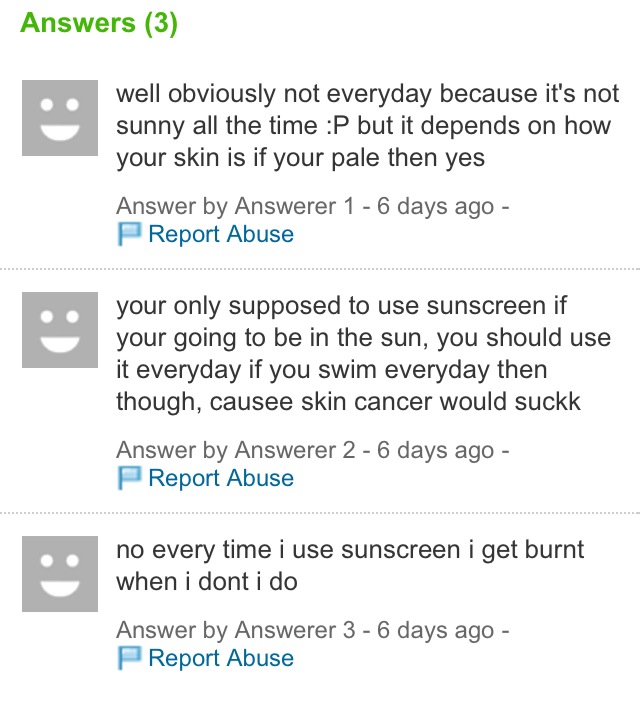It seems rather obvious that the younger generations are searching for answers from their peers on the internet. Sun protection needs to be a topic of discussion with our youth so they get the facts and not the myths, not only to prevent skin cancer but horrible photoaging damage. Recently I came upon this question asked in Yahoo Answers:
“Should I use my sunscreen EVERYDAY? I like to use my sunscreen only at the day when I swim (I swim everyday) so it’s not a waste of money if I use my Waterproof SPF Sunscreen….Should I use my sunscreen everyday?”
This is disheartening because the individual is trying to save money. If he/she was taught what sunscreen actually protected, they would realize that it is more cost effective to prevent early aging and possible skin cancer, not just a sunburn.
First, the poster should be aware that the FDA has recently changed the guidelines regarding the claims of “Waterproof”. Sunscreens and sunblocks can no longer be labeled as “Waterproof” nor “Sweat proof” as both will eventually wash off. Instead, they are labeled as “Water Resistant”.
Here are the answers this poster received. We will take a look at the bad advice, correct it and offer a bit more advice and facts regarding sun protection.
- WRONG: You shouldn’t use sunscreen everyday because it is not sunny all the time. Up to 80 percent of the sun’s UV rays can pass through the clouds.
- WRONG: If your pale, then you should use sunscreen: ALL people of all skin types, pigment and ethnicities should use a sun protection.
- WRONG: Your only supposed to wear sunscreen if you’re going to be in the sun. You should wear a sunscreen daily, especially your face (any skin that is exposed) as UVA rays will pass through window glass. I have personally experienced a “driver’s arm”, where my left arm has been sunburned when driving long distances.
What is the difference between a sunscreen and a sunblock?
A sunscreen absorbs the sun’s rays rather than reflects them as a sunblock will do. Sunblocks will appear white on the skin while sunscreen will be less visible.
What is the difference between UVA and UVB?
Ultraviolet A rays pass through window glass, cause pre-mature aging such as wrinkles and age spots. Ultraviolet B rays are blocked by window glass but are responsible for causing sunburn. Sun protection that is called “broad spectrum” will block both UVA and UVB rays and is recommended as both are harmful and can cause skin cancer.
FACTS and TRUTHS about Sun Protection and Skin Cancer:
- It is recommended to use sunscreen everyday of the year, not just during the summer. Snow will reflect 80 percent of the sun’s rays.
- One person dies every hour of melanoma.
- One in five Americans will develop skin cancer in the course of a lifetime.
- An estimated 6,060 men and 3,120 women in the US will die from melanoma in 2012.
- Asian American and African American melanoma patients have a greater tendency than Caucasians to present with advanced disease at time of diagnosis.
- While melanoma is uncommon in African Americans, Latinos, and Asians, it is frequently fatal for these populations.
- Up to 90 percent of the visible changes commonly attributed to aging are caused by the sun.
It is best for our youth to get accurate information about such serious topics regarding their health and well-being. The only correct statement that was given to the above question was “skin cancer would suck”. Talking to your children about sun protection should be on the list with “say no to drugs” and “the birds and the bees” talk.
References:
American Academy of Dermatology
Skin Cancer Foundation

